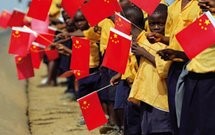 Chinese President Xi Jinping is in South Africa March 26 as part of a three-country tour of the continent. Xi will represent China at the two-day summit of the Brazil-Russia-India-China-South Africa, or BRICS, group of nations. It is Xi's first visit to Africa as president of China. He arrived first in Tanzania and will visit the Republic of the Congo.
Chinese President Xi Jinping is in South Africa March 26 as part of a three-country tour of the continent. Xi will represent China at the two-day summit of the Brazil-Russia-India-China-South Africa, or BRICS, group of nations. It is Xi's first visit to Africa as president of China. He arrived first in Tanzania and will visit the Republic of the Congo.
Xi is visiting the three countries to highlight China's role as a friend to and supporter of Africa's development. As part of this outreach Xi will aim to reassure Africa that it comes with no strings attached, inferring that Western countries obligate governments in Africa with undue pressure or requirements in exchange for natural resource concessions.
African countries view China's energy and commodity resource pursuits with suspicion. From South Africa to Botswana to Zambia and Ethiopia, governments as well as activists have criticized Chinese behavior ranging from displacing host nation laborers to using undocumented Chinese workers to carrying out public works contracts of substandard quality.
African governments do, however, largely find themselves stuck in a dependent relationship with China, despite the rhetoric. China brings ready capital to a resource acquisition deal, as well as a technical capability that most countries in Africa lack. For example, President Xi and President Jacob Zuma are discussing China's cooperation in financing and constructing a new crude oil refinery that the South African government has floated for several years now. With a proposed capacity of 400,000 barrels per day, the cost of the Coega refinery, surely to exceed $10 billion and likely be closer to $20 billion, far exceeds the amount of capital Pretoria and its state owned oil company PetroSA could commit. With no Western financier willing to commit that scale of capital, Pretoria must turn elsewhere. Few apart from the Chinese could assemble that required scale of capital.
China brings a voracious appetite for natural resources that conforms African government behavior, even if that behavior risks government unpopularity. The Michael Sata administration in Zambia, for example, has not constrained China's investments in its copper mines even though Sata conducted a victorious elections campaign highlighting Chinese exploitation of Zambian mining labor. The Mozambique government, as well as Western investors in Mozambique, is focused principally on supplying the Chinese economy when they calculate the risks involved in developing the country's start-up coal and natural gas fields.
Governments in Africa, like anywhere, want to achieve their political and economic objectives. In many instances, China provides them their lowest-financial cost solution. This may bring a political cost, such as the dependency on Chinese labor to carry out the related construction contract or that the resource being extracted is to fulfill market needs in China and not in Africa. But facing scarce resources against a government husbanding a seemingly unparalleled pool of capital, governments in Africa will bear the political price and strike deals with Beijing.
Chinese Investment in Africa courtesy Stratfor (www.stratfor.com)